Posted by: site admin @ 11:05 pm
𝓛𝓔𝓢𝓢𝓞𝓝 4102 Fri 24 Sep to 4110 Sun 3 Oct 2021
Wake up at 03:45 AM
After Bath Practice Patanjali Yogic Meditation From 04:00 AM to 05:00 AM at
𝙆𝙪𝙨𝙝𝙞𝙣𝙖𝙧𝙖 𝙉𝙄𝘽𝘽Ā𝙉𝘼 𝘽𝙃𝙐𝙈𝙄 𝙋𝙖𝙜𝙤𝙙𝙖
18𝙛𝙩 𝘿𝙞𝙖. 𝙖 3𝘿 360 𝙙𝙚𝙜𝙧𝙚𝙚 𝙘𝙞𝙧𝙘𝙪𝙡𝙖𝙧 𝙋𝙖𝙜𝙤𝙙𝙖 𝙖𝙩
𝙒𝙝𝙞𝙩𝙚 𝙃𝙤𝙢𝙚,
668 5𝙩𝙝 𝘼 𝙈𝙖𝙞𝙣 𝙍𝙤𝙖𝙙,
8𝙩𝙝 𝘾𝙧𝙤𝙨𝙨, 𝙃𝘼𝙇 𝙄𝙄𝙄 𝙎𝙩𝙖𝙜𝙚,
𝙋𝙪𝙣𝙞𝙮𝙖 𝘽𝙃𝙐𝙈𝙄 𝘽𝙚𝙣𝙜𝙖𝙡𝙪𝙧𝙪,
𝙈𝙖𝙜𝙖𝙙𝙝𝙞 𝙆𝙖𝙧𝙣𝙖𝙩𝙖𝙠𝙖,
𝙋𝙧𝙖𝙗𝙪𝙙𝙙𝙝𝙖 𝘽𝙝𝙖𝙧𝙖𝙩 𝙄𝙣𝙩𝙚𝙧𝙣𝙖𝙩𝙞𝙤𝙣𝙖𝙡

𝙗𝙪𝙙𝙙𝙝𝙖𝙨𝙖𝙞𝙙2𝙪𝙨@𝙜𝙢𝙖𝙞𝙡.𝙘𝙤𝙢
𝙟𝙘𝙨4𝙚𝙫𝙚𝙧@𝙤𝙪𝙩𝙡𝙤𝙤𝙠.𝙘𝙤𝙢
𝙟𝙘𝙝𝙖𝙣𝙙𝙧𝙖𝙨𝙚𝙠𝙝𝙖𝙧𝙖𝙣@𝙮𝙖𝙝𝙤𝙤.𝙘𝙤𝙢
080-25203792
9449260443
9449835875
Spread the Words of Buddha from
𝙝𝙩𝙩𝙥://𝙨𝙖𝙧𝙫𝙖𝙟𝙖𝙣.𝙖𝙢𝙗𝙚𝙙𝙠𝙖𝙧.𝙤𝙧𝙜, WhataApp, Telegram,Faceboof, Twitter, more than 5000 Emails.
Practice Mindful Swimming at Dolphin Aquatics at Halasuru from 05:30 AM to 07:00 AM
https://www.buddha-vacana.org/

Buddha Vacana
http://www.buddhanet.net/
𝓛𝓔𝓢𝓢𝓞𝓝 4102 Fri 24 Sep 2021
Wake up at 03:45 AM
After Bath Practice Patanjali Yogic Meditation From 04:00 AM to 05:00 AM at
𝙆𝙪𝙨𝙝𝙞𝙣𝙖𝙧𝙖 𝙉𝙄𝘽𝘽Ā𝙉𝘼 𝘽𝙃𝙐𝙈𝙄 𝙋𝙖𝙜𝙤𝙙𝙖
18𝙛𝙩 𝘿𝙞𝙖. 𝙖 3𝘿 360 𝙙𝙚𝙜𝙧𝙚𝙚 𝙘𝙞𝙧𝙘𝙪𝙡𝙖𝙧 𝙋𝙖𝙜𝙤𝙙𝙖 𝙖𝙩
𝙒𝙝𝙞𝙩𝙚 𝙃𝙤𝙢𝙚,
668 5𝙩𝙝 𝘼 𝙈𝙖𝙞𝙣 𝙍𝙤𝙖𝙙,
8𝙩𝙝 𝘾𝙧𝙤𝙨𝙨, 𝙃𝘼𝙇 𝙄𝙄𝙄 𝙎𝙩𝙖𝙜𝙚,
𝙋𝙪𝙣𝙞𝙮𝙖 𝘽𝙃𝙐𝙈𝙄 𝘽𝙚𝙣𝙜𝙖𝙡𝙪𝙧𝙪,
𝙈𝙖𝙜𝙖𝙙𝙝𝙞 𝙆𝙖𝙧𝙣𝙖𝙩𝙖𝙠𝙖,
𝙋𝙧𝙖𝙗𝙪𝙙𝙙𝙝𝙖 𝘽𝙝𝙖𝙧𝙖𝙩 𝙄𝙣𝙩𝙚𝙧𝙣𝙖𝙩𝙞𝙤𝙣𝙖𝙡

𝙗𝙪𝙙𝙙𝙝𝙖𝙨𝙖𝙞𝙙2𝙪𝙨@𝙜𝙢𝙖𝙞𝙡.𝙘𝙤𝙢
𝙟𝙘𝙨4𝙚𝙫𝙚𝙧@𝙤𝙪𝙩𝙡𝙤𝙤𝙠.𝙘𝙤𝙢
𝙟𝙘𝙝𝙖𝙣𝙙𝙧𝙖𝙨𝙚𝙠𝙝𝙖𝙧𝙖𝙣@𝙮𝙖𝙝𝙤𝙤.𝙘𝙤𝙢
080-25203792
9449260443
9449835875
Spread the Words of Buddha from
𝙝𝙩𝙩𝙥://𝙨𝙖𝙧𝙫𝙖𝙟𝙖𝙣.𝙖𝙢𝙗𝙚𝙙𝙠𝙖𝙧.𝙤𝙧𝙜, WhataApp, Telegram,Faceboof, Twitter, more than 5000 Emails.
Practice Mindful Swimming at Dolphin Aquatics at Halasuru from 05:30 AM to 07:00 AM
https://www.buddha-vacana.org/

Buddha Vacana
SEPTEMBER 26
269. Good Health is the highest gain,
And contentment is the greatest wealth.
Trust is the best kinsmen,
And Nibbana is the highest happiness - Buddha
SEPTEMBER 28
271. There are these four ways of answering ques-
tions. Which four? there-is the question that requires a
categorical reply that which requires a counter ques-
tion, that which might be put aside and that which re
-quires a discriminating reply.
SEPTEMBER 29
272 In what way one could say: “The reculse
Gotama .is an annihilationist, he teaches the doctrine
of annihilation,” and speaking correctly? I teach the
annihilation of greed, hatred and delusion. I proclaim
the annihilation of evil unskilled states. It is in this way
that one could say: ” The reculse Gotama is an annihili-
lationist. He teaches the doctrine of annihilation,” And
be speaking correctly.
OCTOBER 3
276. Four things shine in the world,
A fifth you will not find.
By day the sun shines, by night the moon.
Fire gives light both day and night,
Both here and there.
But of all things that shine,
A Buddha is the best.
I do not say that the attainment of profound knowledge comes straight
away; on the contrary, it comes from a gradual training, a gradual
doing, a gradual practice.- Buddha
accharā·saṅghāta·mattam·pi ce, bhikkhave, bhikkhu mettā·cittaṃ āsevati;
ayaṃ vuccati, bhikkhave bhikkhu a·ritta·jjhāno viharati
satthu·sāsana·karo ovāda·pati·karo, a·moghaṃ raṭṭha·piṇḍaṃ bhuñjati. ko
pana vādo ye naṃ bahulīkarontī·ti!
If even for the time of a finger snap, bhikkhus, a bhikkhu pursues a
mind of goodwill, he is called a bhikkhu who is not devoid of jhāna, who
complies with the Teacher’s teaching, who acts according to his
instruction, and who does not eat the country’s almsfood in vain. How
much more, then, those who practice it frequently!
accharā·saṅghāta·mattam·pi ce, bhikkhave, bhikkhu mettā·cittaṃ bhāveti;
ayaṃ vuccati, bhikkhave bhikkhu a·ritta·jjhāno viharati
satthu·sāsana·karo ovāda·pati·karo, a·moghaṃ raṭṭha·piṇḍaṃ bhuñjati. ko
pana vādo ye naṃ bahulīkarontī·ti!
If even for the time of a finger snap, bhikkhus, a bhikkhu develops a
mind of goodwill, he is called a bhikkhu who is not devoid of jhāna, who
complies with the Teacher’s teaching, who acts according to his
instruction, and who does not eat the country’s almsfood in vain. How
much more, then, those who practice it frequently!
accharā·saṅghāta·mattam·pi ce, bhikkhave, bhikkhu mettā·cittaṃ manasi
karoti; ayaṃ vuccati, bhikkhave bhikkhu a·ritta·jjhāno viharati
satthu·sāsana·karo ovāda·pati·karo a·moghaṃ raṭṭha·piṇḍaṃ bhuñjati. ko
pana vādo ye naṃ bahulīkarontī·ti!
If even for the time of a finger snap, bhikkhus, a bhikkhu considers a
mind of goodwill, he is called a bhikkhu who is not devoid of jhāna, who
complies with the Teacher’s teaching, who acts according to his
instruction, and who does not eat the country’s almsfood in vain. How
much more, then, those who practice it frequently!
Powerful Theravada Pali ChantingChanted by Bhante
Indarathanahttps://youtu.be/Yswwm-gxnFU—————————————————————…
https://www.buddha-vacana.org/sutta/samyutta/salayatana/sn35-094.html
Here is one of those advises which are so easy to understand
with the intellect, yet so difficult to understand at deeper levels
because our wrong views constantly interfere in the process. Therefore
we need to get it repeated often, even though that may seem boring to
some.
Pāḷi |
English |
|
|
|
|
cha·y·ime, bhikkhave, phass·āyatanā a·dantā a·guttā a·rakkhitā a·saṃvutā dukkh·ādhivāhā honti. katame cha? |
|
|
cakkhu, bhikkhave, phass·āyatanaṃ a·dantaṃ a·guttaṃ a·rakkhitaṃ a·saṃvutaṃ dukkh·ādhivāhaṃ hoti. |
|
|
sotaṃ, bhikkhave, phass·āyatanaṃ a·dantaṃ a·guttaṃ a·rakkhitaṃ a·saṃvutaṃ dukkh·ādhivāhaṃ hoti. |
|
|
ghāṇaṃ, bhikkhave, phass·āyatanaṃ a·dantaṃ a·guttaṃ a·rakkhitaṃ a·saṃvutaṃ dukkh·ādhivāhaṃ hoti. |
|
|
jivhā, bhikkhave, phass·āyatanaṃ a·dantaṃ a·guttaṃ a·rakkhitaṃ a·saṃvutaṃ dukkh·ādhivāhaṃ hoti |
|
|
kāyo, bhikkhave, phass·āyatanaṃ a·dantaṃ a·guttaṃ a·rakkhitaṃ a·saṃvutaṃ dukkh·ādhivāhaṃ hoti |
|
|
mano, bhikkhave, phass·āyatanaṃ a·dantaṃ a·guttaṃ a·rakkhitaṃ a·saṃvutaṃ dukkh·ādhivāhaṃ hoti. |
|
|
ime kho, bhikkhave, cha phass·āyatanā a·dantā a·guttā a·rakkhitā a·saṃvutā dukkh·ādhivāhā honti. |
|
|
cha·y·ime, bhikkhave, phass·āyatanā su·dantā su·guttā su·rakkhitā su·saṃvutā sukh·ādhivāhā honti. katame cha? |
|
|
cakkhu, bhikkhave, phass·āyatanaṃ su·dantaṃ su·guttaṃ su·rakkhitaṃ su·saṃvutaṃ sukh·ādhivāhaṃ hoti. |
|
|
sotaṃ, bhikkhave, phass·āyatanaṃ su·dantaṃ su·guttaṃ su·rakkhitaṃ su·saṃvutaṃ sukh·ādhivāhaṃ hoti. |
|
|
ghāṇaṃ, bhikkhave, phass·āyatanaṃ su·dantaṃ su·guttaṃ su·rakkhitaṃ su·saṃvutaṃ sukh·ādhivāhaṃ hoti. |
|
|
jivhā, bhikkhave, phass·āyatanaṃ su·dantaṃ su·guttaṃ su·rakkhitaṃ su·saṃvutaṃ sukh·ādhivāhaṃ hoti. |
|
|
kāyo, bhikkhave, phass·āyatanaṃ su·dantaṃ su·guttaṃ su·rakkhitaṃ su·saṃvutaṃ sukh·ādhivāhaṃ hoti. |
|
|
mano, bhikkhave, phass·āyatanaṃ su·dantaṃ su·guttaṃ su·rakkhitaṃ su·saṃvutaṃ sukh·ādhivāhaṃ hoti. |
|
|
ime kho, bhikkhave, cha phass·āyatanā su·dantā su·guttā su·rakkhitā su·saṃvutā sukh·ādhivāhā hontī·ti. |
|
http://www.buddhanet.net/

Daily Readings from the Buddha’s Words of Wisdom
Daily Readings from the Buddha’s Words of Wisdom

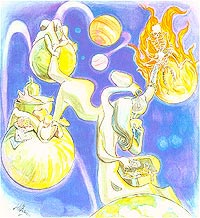 |
Verse 167. Do Not Cultivate The Worldly
Explanation: Stoop not to depraved ways, to practices that |
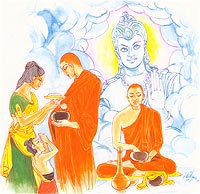 |
Verse 168. The Righteous Are Happy - Here And Hereafter
Explanation: Wake up to reality; do not be delude. Live in |
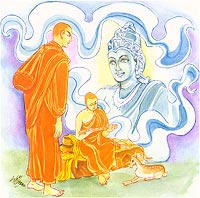 |
Verse 169. Behave According To The Teaching
Explanation: Practice the dhamma to perfection. Do not practice |
 |
Verse 170. Observe The Impermanence Of Life
Explanation: Look at a bubble. How impermanent is it? Look |
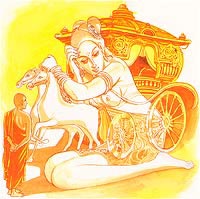 |
Verse 171. The Disciplined Are Not Attached To The Body
Explanation: The spiritually immature ones are fully engrossed |
 |
Verse 172. The Diligent Illumine The World
Explanation: An individual may have been deluded in the past. |
 |
Verse 173. Evil Is Overcome By Good
Explanation: If the evil habits of behaviour of an individual |
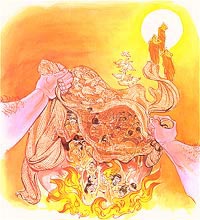 |
Verse 174. Without Eye of Wisdom, This World Is Blind
Explanation: Most people in this world are unable to see. |
 |
Verse 175. The Wise Travel Beyond The Worldly
Explanation: The swans fly away in the sky - as the path of |
 |
Verse 176. A Liar Can Commit Any Crime
Explanation: The evil person who has given up the virtue of |
 |
Verse 177. Happiness Through Partaking In Good Deeds
Explanation: The extreme misers do not reach the heavenly |
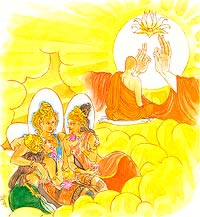 |
Verse 178. Being Stream-Winner Is Supreme
Explanation: The achievement of the stream-winner is the primary |

 |
Verse 180. The Buddha Cannot Be Brought Under Sway
Explanation: The Buddha, in whom there is no thirst (tanha) |
 |
Verse 181. Gods And Men Adore The Buddha
Explanation: Those noble and wise ones are intent on meditation. |
 |
Verse 182. Four Rare Opportunities
Explanation: It is rare that one is born a human being, in |
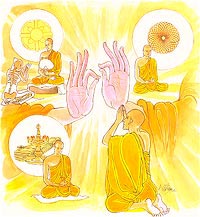 |
Verse 183. The Instructions Of The Buddha
Explanation: Abandoning all evil and purifying one’s |
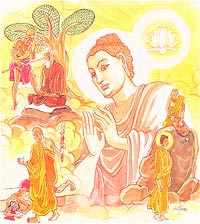 |
Verse 184. Patience Is A Great Ascetic Virtue
Explanation: Enduring patience is the highest asceticism. |
 |
Verse 185. Noble Guidelines
Explanation: To refrain from finding fault with others; to |
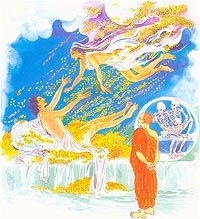 |
Verse 186. Sensual Pleasures Never Satiated
Explanation: Insatiable are sensual desires. Sensual desires |
 |
Verse 187. Shun Worldly Pleasures
Explanation: The discipline of the Buddha does not even go |
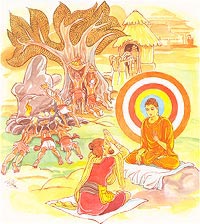 |
Verse 188. Fear Stricken Masses
Explanation: Human beings who tremble in fear seek refuge |
 |
Verse 189. Those Refuges Do Not Help
Explanation: These are not secure refuges. The are not the |
 |
Verse 190. Seeing Four Noble Truths
Explanation: If a wise person were to take |
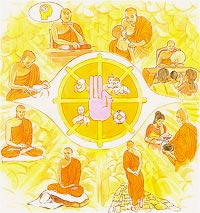 |
Verse 191. The Noble Path
Explanation: The four extraordinary realities are suffering; |
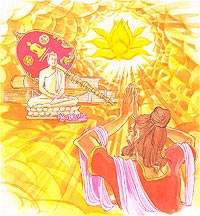 |
Verse 192 The Refuge That Ends All Suffering
Explanation: This refuge in the Triple Refuge is, of course, |
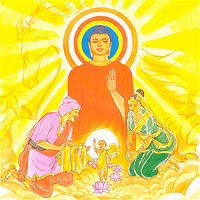 |
Verse 193. Rare Indeed Is Buddha’s Arising
Explanation: The Buddha is rare indeed. Such a rare person |
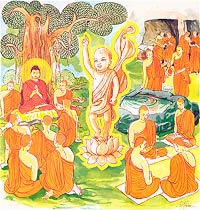 |
Verse 194. Four Factors of Happiness
Explanation: The arising of the Buddha is joyful. The proclamation |
 |
Verse 195. Worship Those Who Deserve Adoration
Explanation: Those who have gone beyond apperception ( the |
 |
Verse 196. Worship Brings Limitless Merit
Explanation: One who worships those who have attained imperturbability |
 |
Verse 179. The Buddha Cannot Be Tempted
Explanation: The Buddha’s victory has not been won incorrectly. |
Daily Readings from the Buddha’s Words of Wisdom
Daily Readings from the Buddha’s Words of Wisdom

 |
Verse 167. Do Not Cultivate The Worldly
Explanation: Stoop not to depraved ways, to practices that |
 |
Verse 168. The Righteous Are Happy - Here And Hereafter
Explanation: Wake up to reality; do not be delude. Live in |
 |
Verse 169. Behave According To The Teaching
Explanation: Practice the dhamma to perfection. Do not practice |
 |
Verse 170. Observe The Impermanence Of Life
Explanation: Look at a bubble. How impermanent is it? Look |
 |
Verse 171. The Disciplined Are Not Attached To The Body
Explanation: The spiritually immature ones are fully engrossed |
 |
Verse 172. The Diligent Illumine The World
Explanation: An individual may have been deluded in the past. |
 |
Verse 173. Evil Is Overcome By Good
Explanation: If the evil habits of behaviour of an individual |
 |
Verse 174. Without Eye of Wisdom, This World Is Blind
Explanation: Most people in this world are unable to see. |
 |
Verse 175. The Wise Travel Beyond The Worldly
Explanation: The swans fly away in the sky - as the path of |
 |
Verse 176. A Liar Can Commit Any Crime
Explanation: The evil person who has given up the virtue of |
 |
Verse 177. Happiness Through Partaking In Good Deeds
Explanation: The extreme misers do not reach the heavenly |
 |
Verse 178. Being Stream-Winner Is Supreme
Explanation: The achievement of the stream-winner is the primary |
-
7,117 languages are spoken today.
That number is constantly in flux, because we’re
learning more about the world’s languages every day. And beyond that,
the languages themselves are in flux. They’re living and dynamic, spoken
by communities whose lives are shaped by our rapidly changing world.
This is a fragile time: Roughly 0% of languages are now endangered,
often with less than 1,000 speakers remaining. Meanwhile, just 23
languages account for more than half the world’s population.
a just born baby is kept isolated without anyone communicating with the
baby, after a few days it will speak and human natural (Prakrit)
language known as Classical Magahi Magadhi/Classical Chandaso
language/Magadhi Prakrit,Classical Hela Basa (Hela Language),Classical
Pāḷi which are the same. Buddha spoke in Magadhi. All the 7,139
languages and dialects are off shoot of Classical Magahi Magadhi. Hence
all of them are Classical in nature (Prakrit) of Human Beings, just like
all other living speices have their own natural languages for
communication. 117 languages are translated by https://translate.google.comin
-
01) Classical Magahi Magadhi,
-
02) Classical Chandaso language,
-
03)Magadhi Prakrit,04)
Classical Hela Basa (Hela Language),
-
05) Classical Pāḷi,
-
06) ClassicalDevanagari,Classical Hindi-Devanagari- शास्त्रीय हिंदी,
-
07) ClassicalCyrillic08) Classical Afrikaans– Klassieke Afrikaans09) Classical Albanian-Shqiptare klasike,10) Classical Amharic-አንጋፋዊ አማርኛ,11) Classical Arabic-اللغة العربية الفصحى12) Classical Armenian-դասական հայերեն,13) Classical Assamese-ধ্ৰুপদী অসমীয়া
14) Classical Azerbaijani- Klassik Azərbaycan,
-
-
20) Classical Catalan-Català clàssic
-
21) Classical Cebuano-Klase sa Sugbo,
-
22) Classical Chichewa-Chikale cha Chichewa,23) Classical Chinese (Simplified)-古典中文(简体),24) Classical Chinese (Traditional)-古典中文(繁體),25) Classical Corsican-Corsa Corsicana,26) Classical Croatian-Klasična hrvatska,
-
27) Classical Czech-Klasická čeština28) Classical Danish-Klassisk dansk,Klassisk dansk,29) Classical Dutch- Klassiek Nederlands,30) Classical English,Roman,31) Classical Esperanto-Klasika Esperanto,32) Classical Estonian- klassikaline eesti keel,
-
33) Classical Filipino klassikaline filipiinlane,
34) Classical Finnish- Klassinen suomalainen,35) Classical French- Français classique,36) Classical Frisian- Klassike Frysk,37) Classical Galician-Clásico galego,38) Classical Georgian-კლასიკური ქართული,39) Classical German- Klassisches Deutsch,40) Classical Greek-Κλασσικά Ελληνικά,41) Classical Gujarati-ક્લાસિકલ ગુજરાતી,42) Classical Haitian Creole-Klasik kreyòl,43) Classical Hausa-Hausa Hausa,44) Classical Hawaiian-Hawaiian Hawaiian,45) Classical Hebrew- עברית קלאסית46) Classical Hmong- Lus Hmoob,47) Classical Hungarian-Klasszikus magyar,48) Classical Icelandic-Klassísk íslensku,49) Classical Igbo,Klassískt Igbo,50) Classical Indonesian-Bahasa Indonesia Klasik,51) Classical Irish-Indinéisis Clasaiceach,52) Classical Italian-Italiano classico,53) Classical Japanese-古典的なイタリア語,54) Classical Javanese-Klasik Jawa,55) Classical Kannada- ಶಾಸ್ತ್ರೀಯ ಕನ್ನಡ,56) Classical Kazakh-Классикалық қазақ,57) Classical Khmer- ខ្មែរបុរាណ,58) Classical Kinyarwanda59) Classical Korean-고전 한국어,60) Classical Kurdish (Kurmanji)-Kurdî (Kurmancî),61) Classical Kyrgyz-Классикалык Кыргыз,62) Classical Lao-ຄລາສສິກລາວ,63) Classical Latin-LXII) Classical Latin,64) Classical Latvian-Klasiskā latviešu valoda,65) Classical Lithuanian-Klasikinė lietuvių kalba,66) Classical Luxembourgish-Klassesch Lëtzebuergesch,67) Classical Macedonian-Класичен македонски,68) Classical Malagasy,класичен малгашки,69) Classical Malay-Melayu Klasik,70) Classical Malayalam-ക്ലാസിക്കൽ മലയാളം,71) Classical Maltese-Klassiku Malti,72) Classical Maori-Maori Maori,73) Classical Marathi-क्लासिकल माओरी,74) Classical Mongolian-Сонгодог Монгол,75) Classical Myanmar (Burmese)-Classical မြန်မာ (ဗမာ),76) Classical Nepali-शास्त्रीय म्यांमार (बर्मा),77) Classical Norwegian-Klassisk norsk,
-
78) Classical Odia (Oriya)79) Classical Pashto- ټولګی پښتو80) Classical Persian-کلاسیک فارسی81) Classical Polish-Język klasyczny polski,82) Classical Portuguese-Português Clássico,83) Classical Punjabi-ਕਲਾਸੀਕਲ ਪੰਜਾਬੀ,84) Classical Romanian-Clasic românesc,85) Classical Russian-Классический русский,86) Classical Samoan-Samoan Samoa,
-
87) Classical Sanskrit छ्लस्सिचल् षन्स्क्रित्88) Classical Scots Gaelic-Gàidhlig Albannach Clasaigeach,
-
89) Classical Serbian-Класични српски,90) Classical Sesotho-Seserbia ea boholo-holo,91) Classical Shona-Shona Shona,92) Classical Sindhi,93) Classical Sinhala-සම්භාව්ය සිංහල,94) Classical Slovak-Klasický slovenský,95) Classical Slovenian-Klasična slovenska,96) Classical Somali-Soomaali qowmiyadeed,97) Classical Spanish-Español clásico,98) Classical Sundanese-Sunda Klasik,99) Classical Swahili,Kiswahili cha Classical,100) Classical Swedish-Klassisk svensk,101) Classical Tajik-тоҷикӣ классикӣ,
102) Classical Tamil-பாரம்பரிய இசைத்தமிழ் செம்மொழி,103) Classical Tatar104) Classical Telugu- క్లాసికల్ తెలుగు,105) Classical Thai-ภาษาไทยคลาสสิก,106) Classical Turkish-Klasik Türk,107) Classical Turkmen108) Classical Ukrainian-Класичний український,109) Classical Urdu- کلاسیکی اردو110) Classical Uyghur,111) Classical Uzbek-Klassik o’z,112) Classical Vietnamese-Tiếng Việ,113) Classical Welsh-Cymraeg Clasurol,114) Classical Xhosa-IsiXhosa zesiXhosa,115) Classical Yiddish- קלאסישע ייִדיש116) Classical Yoruba-Yoruba Yoruba,117) Classical Zulu-I-Classical Zulu
-
7,117 languages are spoken today.
That number is constantly in flux, because we’re
learning more about the world’s languages every day. And beyond that,
the languages themselves are in flux. They’re living and dynamic, spoken
by communities whose lives are shaped by our rapidly changing world.
This is a fragile time: Roughly 0% of languages are now endangered,
often with less than 1,000 speakers remaining. Meanwhile, just 23
languages account for more than half the world’s population.
a just born baby is kept isolated without anyone communicating with the
baby, after a few days it will speak and human natural (Prakrit)
language known as Classical Magahi Magadhi/Classical Chandaso
language/Magadhi Prakrit,Classical Hela Basa (Hela Language),Classical
Pāḷi which are the same. Buddha spoke in Magadhi. All the 7,139
languages and dialects are off shoot of Classical Magahi Magadhi. Hence
all of them are Classical in nature (Prakrit) of Human Beings, just like
all other living speices have their own natural languages for
communication. 117 languages are translated by https://translate.google.comin
-
01) Classical Magahi Magadhi,
-
02) Classical Chandaso language,
-
03)Magadhi Prakrit,04)
Classical Hela Basa (Hela Language),
-
05) Classical Pāḷi,
-
06) ClassicalDevanagari,Classical Hindi-Devanagari- शास्त्रीय हिंदी,
-
07) ClassicalCyrillic08) Classical Afrikaans– Klassieke Afrikaans09) Classical Albanian-Shqiptare klasike,10) Classical Amharic-አንጋፋዊ አማርኛ,11) Classical Arabic-اللغة العربية الفصحى12) Classical Armenian-դասական հայերեն,13) Classical Assamese-ধ্ৰুপদী অসমীয়া
14) Classical Azerbaijani- Klassik Azərbaycan,
-
-
20) Classical Catalan-Català clàssic
-
21) Classical Cebuano-Klase sa Sugbo,
-
22) Classical Chichewa-Chikale cha Chichewa,23) Classical Chinese (Simplified)-古典中文(简体),24) Classical Chinese (Traditional)-古典中文(繁體),25) Classical Corsican-Corsa Corsicana,26) Classical Croatian-Klasična hrvatska,
-
27) Classical Czech-Klasická čeština28) Classical Danish-Klassisk dansk,Klassisk dansk,29) Classical Dutch- Klassiek Nederlands,30) Classical English,Roman,31) Classical Esperanto-Klasika Esperanto,32) Classical Estonian- klassikaline eesti keel,
-
33) Classical Filipino klassikaline filipiinlane,
34) Classical Finnish- Klassinen suomalainen,35) Classical French- Français classique,36) Classical Frisian- Klassike Frysk,37) Classical Galician-Clásico galego,38) Classical Georgian-კლასიკური ქართული,39) Classical German- Klassisches Deutsch,40) Classical Greek-Κλασσικά Ελληνικά,41) Classical Gujarati-ક્લાસિકલ ગુજરાતી,42) Classical Haitian Creole-Klasik kreyòl,43) Classical Hausa-Hausa Hausa,44) Classical Hawaiian-Hawaiian Hawaiian,45) Classical Hebrew- עברית קלאסית46) Classical Hmong- Lus Hmoob,47) Classical Hungarian-Klasszikus magyar,48) Classical Icelandic-Klassísk íslensku,49) Classical Igbo,Klassískt Igbo,50) Classical Indonesian-Bahasa Indonesia Klasik,51) Classical Irish-Indinéisis Clasaiceach,52) Classical Italian-Italiano classico,53) Classical Japanese-古典的なイタリア語,54) Classical Javanese-Klasik Jawa,55) Classical Kannada- ಶಾಸ್ತ್ರೀಯ ಕನ್ನಡ,56) Classical Kazakh-Классикалық қазақ,57) Classical Khmer- ខ្មែរបុរាណ,58) Classical Kinyarwanda59) Classical Korean-고전 한국어,60) Classical Kurdish (Kurmanji)-Kurdî (Kurmancî),61) Classical Kyrgyz-Классикалык Кыргыз,62) Classical Lao-ຄລາສສິກລາວ,63) Classical Latin-LXII) Classical Latin,64) Classical Latvian-Klasiskā latviešu valoda,65) Classical Lithuanian-Klasikinė lietuvių kalba,66) Classical Luxembourgish-Klassesch Lëtzebuergesch,67) Classical Macedonian-Класичен македонски,68) Classical Malagasy,класичен малгашки,69) Classical Malay-Melayu Klasik,70) Classical Malayalam-ക്ലാസിക്കൽ മലയാളം,71) Classical Maltese-Klassiku Malti,72) Classical Maori-Maori Maori,73) Classical Marathi-क्लासिकल माओरी,74) Classical Mongolian-Сонгодог Монгол,75) Classical Myanmar (Burmese)-Classical မြန်မာ (ဗမာ),76) Classical Nepali-शास्त्रीय म्यांमार (बर्मा),77) Classical Norwegian-Klassisk norsk,
-
78) Classical Odia (Oriya)79) Classical Pashto- ټولګی پښتو80) Classical Persian-کلاسیک فارسی81) Classical Polish-Język klasyczny polski,82) Classical Portuguese-Português Clássico,83) Classical Punjabi-ਕਲਾਸੀਕਲ ਪੰਜਾਬੀ,84) Classical Romanian-Clasic românesc,85) Classical Russian-Классический русский,86) Classical Samoan-Samoan Samoa,
-
87) Classical Sanskrit छ्लस्सिचल् षन्स्क्रित्88) Classical Scots Gaelic-Gàidhlig Albannach Clasaigeach,
-
89) Classical Serbian-Класични српски,90) Classical Sesotho-Seserbia ea boholo-holo,91) Classical Shona-Shona Shona,92) Classical Sindhi,93) Classical Sinhala-සම්භාව්ය සිංහල,94) Classical Slovak-Klasický slovenský,95) Classical Slovenian-Klasična slovenska,96) Classical Somali-Soomaali qowmiyadeed,97) Classical Spanish-Español clásico,98) Classical Sundanese-Sunda Klasik,99) Classical Swahili,Kiswahili cha Classical,100) Classical Swedish-Klassisk svensk,101) Classical Tajik-тоҷикӣ классикӣ,
102) Classical Tamil-பாரம்பரிய இசைத்தமிழ் செம்மொழி,103) Classical Tatar104) Classical Telugu- క్లాసికల్ తెలుగు,105) Classical Thai-ภาษาไทยคลาสสิก,106) Classical Turkish-Klasik Türk,107) Classical Turkmen108) Classical Ukrainian-Класичний український,109) Classical Urdu- کلاسیکی اردو110) Classical Uyghur,111) Classical Uzbek-Klassik o’z,112) Classical Vietnamese-Tiếng Việ,113) Classical Welsh-Cymraeg Clasurol,114) Classical Xhosa-IsiXhosa zesiXhosa,115) Classical Yiddish- קלאסישע ייִדיש116) Classical Yoruba-Yoruba Yoruba,117) Classical Zulu-I-Classical Zulu

